
Linking farmers' hubs to potential buyers to enhance inclusive growth
Established in 2019, Gakiuma Hub located in Tharaka Nithi County serves 507 farmers from three main groups.
Before the formation of the hub, members had pre-production and post-harvest challenges. They could not access quality seeds to plant and this factor dwindled their harvests by a greater margin.
“Farmers used to smear a mixture of cow dung and ash in preparation for drying sites since they lacked turplins and other post-harvest handling materials. This affected the quality due to high levels of aflatoxin, bad odour, foreign materials and grain discoloration which in return affected the selling price per kilo “said Flora a marketing committee member, Gakiuma hub.
In 2019, Cereal Growers Association (CGA) through partnership with Christian Aid introduced the Hub model under Cereal Value Chain Enhancement Project (CVEP). The hub model has been a solution to the various challenges facing farmer groups within the smallholder agriculture set-up. At the hub farmers get access to the input suppliers, mechanization service providers, post-harvest service providers, financial/crop insurance service providers and potential buyers including local traders, large processors and exporting companies. CGA has promoted the aggregation of input demand, output aggregation and access to extension and marketing information at the hubs.
“Before CGA’s intervention middlemen/brokers affected market prices a lot. They could buy our farm produce at very low prices and because we lacked a bargaining power, we ended up making losses from our venture” said Daniel a member of Gakiuma hub.
Today, members of Gakiuma hub fetch better market prices since they entered into contract farming with East Africa Breweries Limited (EABL).Before the contract, farmers sold their produce at individual level with prices ranging between 28 to 30ksh per kilo of sorghum. Gakiuma members are a happy lot, EABL offers them the price of 37ksh per kilo of sorghum sold. Through contract farming, CGA has enabled farmers to gain real value for their farm produce. In 2019, a total of 10,000 tons was sold through the hub. This is an impressive turn-over for the farmers.
“Lack of critical knowledge on agripreneurship and mechanization played a major cause to our low production. We lacked exposure to cumulative input purchase and this translated to high production costs, hence we opted for the traditional farming methods” said Purity a member of Gakiuma hub.
CGA’s CVEP Project has improved the lives of farmers by a greater margin through training on aggregation, conservation agriculture principles, agripreneurship, financial literacy, market intelligence and business management. The farmers are now financially secure and run their lives without a lot of struggle. The banks and Sacco’s have reduced risks such as loss of money by the members in that farmers are paid by cheque through the hub.
Gaikuma hub members are thrilled that the training has helped them improve production and increase sales. They can provide for their families and they are now happily giving back to the community by training other farmers on good agricultural practices and agripreneurship skills.
To increase production and quality further, Gakiuma hub members have developed a strategic business plan in bid to acquire better infrastructure such as; threshers, labelling machines, motorized tuktuk, digital weighing machine, pallets, turplins and sack overlock sewing machine.
Through CGA supported hubs a number of youth who were unemployed are actively involved in loading of the produce to the trucks hence earning some livelihood, and becoming self- reliant. Crime rates have also reduced which was otherwise propagated by idle youths.
Women are now economically empowered. The project has enabled them have purchasing power to fend for their families. Many are educating their children in good private schools. School dropout rate has also reduced drastically in the community.
“Lack of money was among the factors attributed to domestic violence. But through CGA, many families are in the capacity to put food on the table, enhancing a peaceful environment for the families,” said Flora
Initially, most Gakiuma hub members didn’t have good smartphones. Today, most of the members can afford smartphones which has been helpful in accessing information on various online platforms and is beneficial to their farming venture.
The high concentration of farmers has attracted emergence of agrovets within range which has eased access to quality farm products such as quality seeds, fertilizer etc.
Exchange visit has also been an effective tool which impacted the farmers. Through the exchange program, farmers learnt aspects of mechanization, and other best farming practices which has enabled them increase their yields
Leadership skills is a very important management tool. CGA has been able to organize Gakiuma Hub in such a way that they deliver beyond expectations. The hub has 5 sub-committees tasked with different roles. The production committees ensures farmers use the right technology and employ the recommended standards while undertaking their farming venture. The marketing committee ensure the farm produce has access to the market at the best prices, mechanization committee is fully committed on providing farming schedules and provision of feedback to farmers on their farming results and the management committee oversee the entire functioning and operation of Gakiuma hub to ensure it runs smoothly and efficiently.
With Christian Aid support, CGA has established 8 hubs across four counties and reaching more than 2500 small holder farmers with a specific focus in Increasing productivity of sorghum and green grams, improved adoption of good agricultural practices and enhanced access to structured markets.
“Aggregation has reduced crime rates among the youth since they are busy threshing, transporting farm produce using boda boda, loading and offloading”
